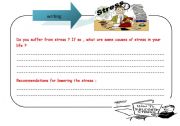
|
stress every where
Do you suffer from stress ? If so , what are some causes of stress in your life ?
Level: intermediate
Age: 14-17
Type: worksheet
Downloads: 3
|
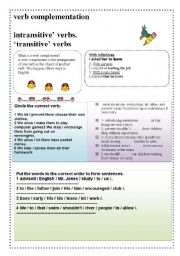
|
verb complementation in transitive� verbs. �transitive� verbs
What is a verb complement?
A verb complement is the arrangement of one verb as the object of another verb. This happens three ways in English
Level: intermediate
Age: 14-17
Type: worksheet
Downloads: 5
|
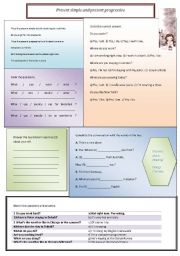
|
Present simple and present progressive
� Use the present simple to talk about regular activities.
He plays golf on the weekends.
� Use the present progressive to talk about current or
temporary activities.
He�s talking to someone on the phone right now.
I�m staying with a friend for a week.
Level: intermediate
Age: 10-17
Type: worksheet
Downloads: 5
|
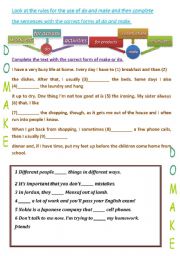
|
do--make
Look at the rules for the use of do and make and then complete
the sentences with the correct forms of do and make
Level: intermediate
Age: 14-17
Type: worksheet
Downloads: 35
|

|
color share friends
enjoy coloring
share friends
Level: elementary
Age: 3-17
Type: worksheet
Downloads: 0
|
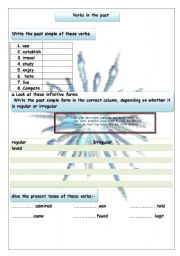
|
Verbs in the past
Write the past simple of these verbs
a Look at these infinitive forms
Write the past simple form in the correct column, depending on whether it is regular or irregular
Give the present tense of these verbs:-
Level: elementary
Age: 10-17
Type: worksheet
Downloads: 1
|
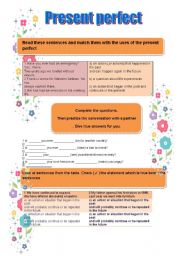
|
present perfect vs. past simple
Read these sentences and match them with the uses of the present perfect
Complete the questions. Then practice the conversation with a partner. Give true answers for you.
Look at sentences from the table. Check (✓) the statement which is true below the sentences.
Level: intermediate
Age: 10-17
Type: worksheet
Downloads: 11
|
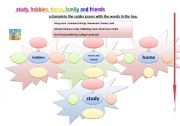
|
study, hobbies, home, family and friends
a Complete the spider grams with the words in the box.
Complete the paragraph with words from the spider grams in exercise
Level: elementary
Age: 9-17
Type: worksheet
Downloads: 4
|
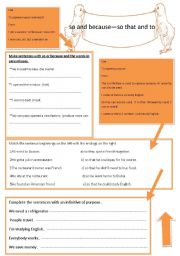
|
so and because�so that and to
1
To express reason and result.
Form:
I put a sweater on because I was cold.
I was cold, so I put a sweater on
2
To express purpose.
Form:
The to infinitive is used to express purpose. In order to can also be used.
I came to the U.S. to study English.
So that can also be used. It is often followed by could / can or would.
I came to the...
Level: intermediate
Age: 10-17
Type: worksheet
Downloads: 26
|
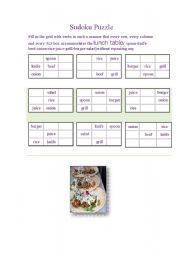
|
Game Sudoku Puzzle(lunch table )
Fill in the grid with verbs in such a manner that every row, every column and every 3x3 box accommodates the lunch table( spoon-knife-beef-onion-rice-juice-grill-burger-salad)without repeating any.
Level: elementary
Age: 10-17
Type: worksheet
Downloads: 3
|
|

learn with games part4
dial up a word
U will remember the new words for ever
READ>>> Choose >>>play>>>Write �what did you do yesterday??
Level: intermediate
Age: 14-17
Downloads: 17
|

learn with games part 2
PAST SIMPLE OR THE PAST CONTINUOUS .
What does she look like? What is she like?
describing people
Level: intermediate
Age: 10-17
Downloads: 32
|

life events
Build 3 sentences about your life events using the past-present-future
Level: intermediate
Age: 10-17
Downloads: 10
|
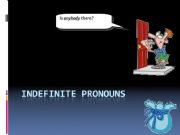
indefinite pronouns
1--BODY / ONE
Everybody
Somebody
Anybody
Nobody
2--WHERE
Everywhere
Somewhere
Anywhere
Nowhere
3--THING
Everything
Something
Anything
Nothing
Level: intermediate
Age: 14-17
Downloads: 69
|

learn with games part 1
ss will play
and learn using a very nice game
talking about
1-the present progressive as future
2-describing people
Level: intermediate
Age: 10-17
Downloads: 33
|
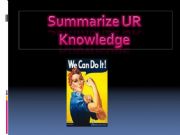
Summarize UR Knowledge
Summarize the new information in this concepting map ��
Answer these question
Control your knowledge progress
Level: elementary
Age: 10-17
Downloads: 9
|
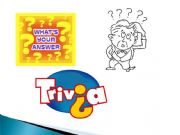
Science Trivia Quiz
science is not limited to what happens inside the laboratory - it is what is going on around us all the time. Science is a study of everything, it is a search for knowledge about the many things that surrounds us, life for people today is very different from what it was for people 5,000 years ago, t...
Level: intermediate
Age: 10-17
Downloads: 13
|

The apostrophe
The apostrophe has only a handful of uses, but these uses are very important. A misplaced apostrophe can be annoying � not to mention lonely.
Level: intermediate
Age: 14-17
Downloads: 14
|

Much, many, a lot, lots
Much/Many, A lot of
Much and Many
We use�much�with�non count nouns�and�many�with�count nouns
A lot of
We use�a lot of�with non count nouns and plural count nouns.
Level: elementary
Age: 10-17
Downloads: 18
|
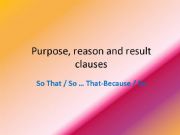
Purpose, reason and result clauses
There are a number of other ways of�expressing purpose�in English
Level: intermediate
Age: 10-17
Downloads: 27
|
|
|